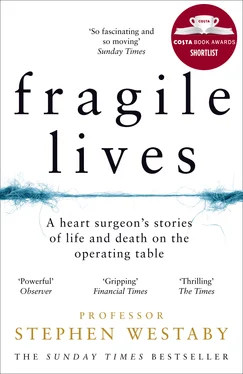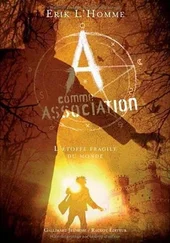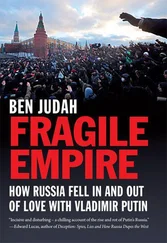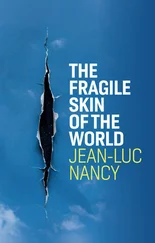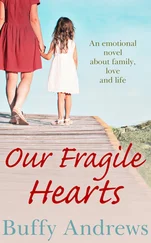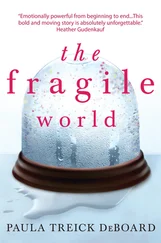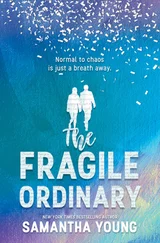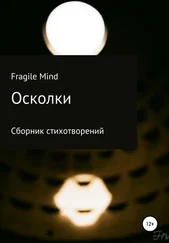The grateful heart muscle responded rapidly. Straight out of the textbook, the heart rate accelerated and the blood pressure soared, up and up, dangerously testing the stitches. Then, as if in slow motion, the cannula site in the aorta gave way. Whoosh! Like a geyser erupting, a crimson fountain hit the operating lights, spraying the surgeons and soaking the green drapes. Someone murmured, ‘Oh, shit.’ An understatement. The battle was lost.
Before a finger could plug the hole the heart was empty. Blood dripped from the lights and red rivulets streamed across the marble floor. Rubber soles stuck to it. The anaesthetist frantically squeezed bags of blood into the veins, but to no avail. Life was fast ebbing away. As the injected slug of adrenaline wore off, the turgid heart simply blew up like a balloon and stopped. Stopped forever.
The surgeons stood silently in despair, as they did week after week. The senior surgeon then walked away out of my view and the anaesthetist turned off the ventilator, waiting for the electrocardiogram to flatline. He removed the tube from the patient’s windpipe, then he too disappeared from view. The brain was already dead.
Just yards away mist descended on the Strand. Commuters rushed into Charing Cross Station to get out of the rain, late lunches were finishing at Simpson’s and Rules, cocktails were being shaken in the Waldorf and the Savoy. That was life, this was death. A lonely death on the operating table. No more pain, no more breathlessness, no more love, no more hate. No more anything.
The perfusionist wheeled his machine out of theatre, and it would take hours to disassemble, clean, restore and sterilise it for the next patient. Only the scrub nurse lingered. Then she was joined by the anaesthetic nurse who had comforted the patient in the anteroom. They took off their masks and stood silently for a while, unconcerned by the sticky blood that covered every surface and by the chest still splinted open. The anaesthetic nurse searched for the patient’s hand beneath the drapes and held it. The scrub nurse pulled away the blood-soaked covering from the face and stroked it. I could see the patient was a young woman.
They were oblivious to the fact that I was upstairs in the ether dome. No one had seen me there. Only Grim Reaper – and he’d already departed with the soul. I gingerly shifted along the bench to look at the woman’s face. Her eyes were wide open, staring up into the dome. She was ashen white but still beautiful, with her fine cheek bones and jet black hair.
Like the nurses I couldn’t leave. I needed to know what happened next. They peeled back the bloodied drapes from her naked body. I was silently screaming for them to take out that hideous retractor cranking open her breastbone and let her poor heart go back to where it belonged. When they did the ribs recoiled and the poor lifeless organ was covered again. It lay flat, empty and defeated in its own space, with just a fearsome, deep gash separating her swollen breasts.
The intercom was still switched on and the nurses started to talk.
‘What’ll happen to her baby?’
‘Adopted, I guess. She wasn’t married. Her parents were killed in the Blitz.’
‘Where did she live?’
‘Whitechapel, but I’m not sure the London do heart surgery yet. She got really sick during the pregnancy. Rheumatic fever. She nearly died during the delivery. Might’ve been for the best.’
‘Where’s the baby now?’
‘On the ward, I think. Matron’ll have to deal with it.’
‘Does she know?’
‘Not yet. You go and find her. I’ll get some help to finish off.’
It was all so matter of fact. A young woman had died, her baby left without a relative in the world. No more love, no more warmth, lost amid that tangled, blood-soaked technology in the operating theatre. Was I ready for this? Was this what I aspired to?
Two student nurses came to wash the body. I recognised them as respectful public schoolgirls from the Friday-night freshers’ dance. They’d brought a bucket of soapy water with sponges and set about scrubbing her clean. They removed the vascular cannulas and the bladder catheter but were visibly upset by the wound and what lay beneath. Blood kept slopping out of it.
‘What did she have done?’ asked the girl I’d danced with.
‘Heart operation, obviously,’ came the reply. ‘Valve replacement, I guess. Poor kid. She’s only our age. Bet her mum’s upset.’
They covered the wound with gauze to soak the blood, then taped it up. The scrub nurse returned and thanked the girls for a job well done. She called back the surgical registrar to close over the wound, ready to move the body to the mortuary, as all deaths on the operating table are referred to the coroner for autopsy. The young woman would be sliced open again from neck to pubis, so there was no point closing the breastbone or bringing together the different layers of the chest wall. He took a big needle and some thick braid, and sewed her up like a mail bag. The wound edges still gaped and oozed serum. Mail bags were much neater.
It was now around 6.30 in the evening and I was meant to be in the pub down the road getting pissed with the rugby team. But I still couldn’t leave. I was attached to this empty shell, this skinny corpse I’d never met but now felt I knew well. I’d been with her at the single most important part of her life.
The three nurses manhandled her into a starched white shroud with a ruff around the neck, tied it up at the back then secured her ankles with a bandage. She was beginning to stiffen with rigor mortis. The students had done their job with kindness and respect. I knew that I would meet them again. Maybe I’d ask them how they felt.
Now there were just the two of us left, the corpse and me. The operating lights still shone on her face and she was staring straight up at me. Why hadn’t they closed her eyelids like they did in the movies? I could see through those dilated pupils to the pain etched on her brain.
From fragments of conversation I’d overheard and with just a little medical knowledge I could sketch her life story. She was in her twenties. Born in the East End. She could only have been a small child when her parents were killed in the bombing. As a child she carried the scars of those sights and sounds, the fear of being alone as her world disintegrated. Brought up in poverty, she develops rheumatic fever, a simple streptococcal sore throat that triggers a devastating inflammatory process. Rheumatic fever was common in areas of deprivation and overcrowding. Perhaps she had painful, swollen joints for a few weeks. What she doesn’t know is that the same inflammation is in her heart valves. There was no diagnostic test in those days.
She develops chronic rheumatic heart disease and is known as a sickly child. Perhaps she develops rheumatic chorea – involuntary, jerky movements, unsteady gait and emotional turmoil. She gets pregnant, an occupational hazard. But this makes things worse as her sick heart must work much harder. She becomes breathless and swollen but makes it through to term. Maybe the London Hospital delivers her safely but recognises heart failure. A murmur. A leaking mitral valve. They prescribe the heart drug digoxin to make it beat stronger, but she doesn’t take it as it makes her nauseous. Soon she’s too tired and breathless to look after the baby, and she cannot lie flat. With worsening heart failure her outlook is grim. They send her to the city to see a surgeon, a real gentleman in a morning suit with pinstriped trousers. He’s kind and sympathetic, and says that only surgery on her mitral valve can help. But it doesn’t. It terminates her sad life and leaves another orphan in the East End.
When the porters came for her the operating lights had long been switched off. The mortuary trolley – a tin coffin on wheels – was drawn up alongside the operating table. By now her limbs were rigid. The body was unceremoniously dragged into this human sardine can, her head bouncing with a sickening thud, but nothing could hurt her any more. I was relieved to lose eye contact. A green woollen blanket was folded over the top to make it look like an ordinary trolley, and then off they went to slot her into the fridge. Her baby would never see her again, would never have a mother again.
Читать дальше
